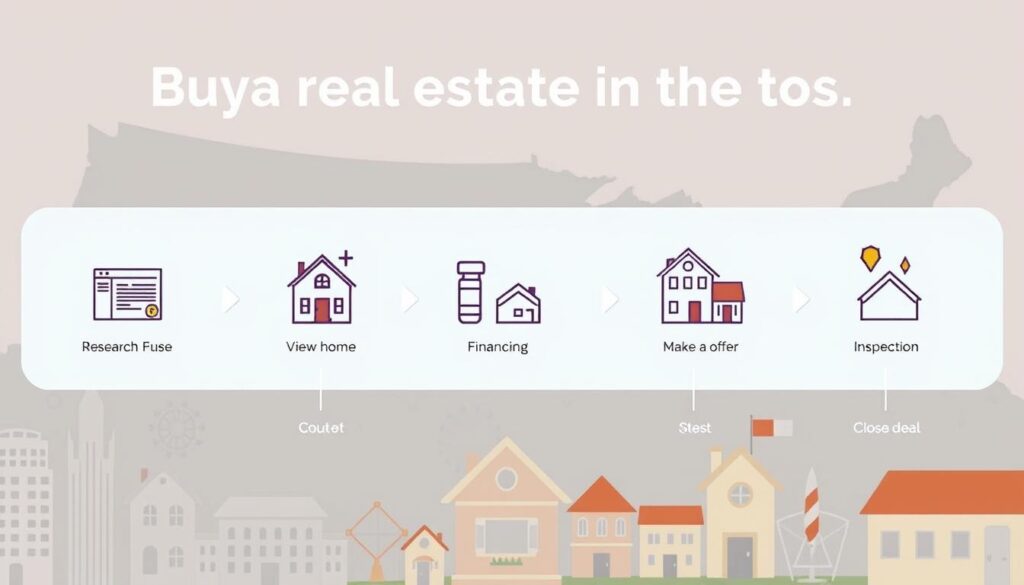Purchasing homes in the United States as a foreigner is a viable option, backed by significant real estate investments made by non-US residents. From April 2022 to March 2023, foreign investors purchased residential real estate worth $53.3 billion1. The process of real estate investment for non-US residents is streamlined, with no federal restrictions on owning property in America2. However, the journey isn’t without its challenges, especially in terms of financing and navigating the legal intricacies.
Despite these potential hurdles, foreigners continue to see the value in owning property in America. For instance, from January to December 2023, approximately $45 billion was invested in the U.S. commercial real estate market by international buyers1. With the right approach and assistance from experienced real estate agents, the complexities can be managed effectively to reap substantial benefits.
Key Takeaways: How to Buy a Property in United States
- Foreign nationals have the same rights to homeownership as US citizens2.
- Significant real estate investments by international buyers indicate a healthy market1.
- The top destinations for property purchases by foreigners include Florida, California, and Texas1.
- Obtaining an FHA loan can be a viable path for permanent residents and eligible non-residents2.
- Expert advice and thorough documentation are crucial to navigating tax and legal requirements effectively2.
Contact us if you are Interested in Buying Property Abroad!
Introduction: Real Estate Opportunities for Non-US Residents
In recent years, the landscape for foreign ownership of real estate in the USA has become increasingly robust and inviting. The U.S. real estate market offers diverse investment opportunities for non-US residents, encompassing a variety of property types including residential, commercial, and land. Buyers from Canada, China, Mexico, India, and Colombia have been particularly active, contributing significantly to the $42 billion in residential purchases from April 2023 to March 20243.
One of the key advantages of buying property in America as a foreigner is the equal treatment foreign investors receive compared to American citizens, especially regarding property rights and tax obligations. Notably, Florida attracts the highest number of foreign buyers, making it a prime location for those looking to invest in U.S. real estate3.
Understanding the tax implications is crucial when navigating the U.S. real estate market. For instance, rental income is categorized as FDAP (Fixed, Determinable, Annual, and Periodic) and is typically subject to a 30% flat tax rate for nonresident aliens4. Additionally, the Foreign Investment in Real Property Tax Act (FIRPTA) mandates a 15% withholding of the sale price for foreign nationals selling U.S. property4.
An awareness of local market trends and strategic planning for location can greatly enhance the success of any investment. This is especially relevant given the rise in foreign investment in U.S. real estate, where Canada’s investment alone amounts to $15.98 billion in commercial properties4. Furthermore, non-resident investors hold a significant portion of U.S. agricultural land, with over 40 million acres under foreign ownership4.
As the market welcomes foreign buyers, providing a fair playing field, strategic adherence to tax regulations and thorough research into market conditions are essential for achieving fruitful investment outcomes. Whether it’s buying property in America as a foreigner for personal use or as an investment, the potential is expansive and promising.
Legalities of Buying Real Estate in the US

Understanding the legalities of foreigners buying real estate in the US is essential for a smooth purchase process. Foreign nationals should be aware of both federal and state regulations that might affect their ability to own property in the United States.
Federal Restrictions
On a federal level, there are no restrictions on foreign ownership of real estate in the US. This means that non-U.S. citizens, including permanent residents, temporary residents, refugees, asylum seekers, and recipients of the DACA program, among others, can buy various types of properties without legal restrictions. However, certain federal laws such as the Foreign Investment in Real Property Tax Act (FIRPTA) impose withholding taxes on the sale of U.S. real estate by non-resident aliens5.
State-Specific Regulations
State-specific regulations can significantly impact the legalities of foreigners buying real estate in the US. For instance, more than half of the states, including Florida, Texas, and Virginia, have adopted land acquisition restrictions related to foreign ownership of real estate6. Some of these states, such as Alabama and Missouri, have additional regulations prohibiting foreign principals from acquiring agricultural land within a certain distance from military installations6. It’s important for foreign buyers to research state-specific laws before making a purchase.
Impact on Immigration Status
It is important to note that purchasing property in the U.S. does not confer residency or affect an individual’s immigration status. While owning real estate might support certain visa applications, it does not automatically qualify the owner for residency or citizenship. Foreign buyers should consult with immigration attorneys to understand the full implications.
Foreign buyers are advised to work with a trustworthy real estate agent to navigate these complexities and ensure compliance with all legal requirements when buying property in the US. For more detailed guidelines, you may refer to this link5.
Can Foreigners buy Real Estate in the United States

When exploring real estate investment for non-US residents, it is reassuring to know that foreigners can indeed buy real estate in the United States. The U.S. real estate market offers a wide array of opportunities, and there are no federal restrictions impeding foreign ownership of properties. In fact, international buyers purchased $53.3 billion in U.S. real estate between April 2022 and March 20237, highlighting this market’s attractiveness to investors worldwide.
The process of acquiring property is essentially the same for foreign buyers and U.S. citizens, making this pathway both straightforward and accessible. This has led to foreign nationals spending $42 billion on residential properties from April 2023 to March 2024, resulting in 54,300 existing home purchases8. However, prospective buyers should be aware that certain mortgage providers have more stringent requirements for non-citizens, necessitating thorough documentation such as income verification letters and banking references9.
Notably, some banks, such as HSBC and First American Bank, offer tailored mortgage solutions specifically designed for international clients9. Furthermore, non-U.S. citizens can obtain an FHA-insured mortgage under the same terms as U.S. citizens provided they meet the required criteria7.
From a tax perspective, it is crucial to understand the implications of purchasing real estate in the United States. While the US estate tax exemption for its citizens stands at $11.4 million, for non-citizens it is significantly lower at just $60,0009. Additionally, income from real properties in the U.S. is taxed at a 30% rate for non-U.S. citizens not engaged in a trade or business7. Such details underscore the importance of thorough tax planning and the potential benefits of tax treaties between the U.S. and one’s home country9.
Given the intricate details involved in real estate investment for non-US residents, it is highly recommended to work with real estate agents who specialize in international clients9. By doing so, foreign buyers can navigate the market efficiently and maximize their investment potential.
| Key Points | Details |
|---|---|
| Total International Purchases (Apr 2022 – Mar 2023) | $53.3 billion7 |
| Total Residential Purchases (Apr 2023 – Mar 2024) | $42 billion8 |
| US Estate Tax Exemption for Non-Citizens | $60,0009 |
| Average Rental Yields | 8%8 |
| Typical Earnest Money Deposit | 1%-3% of purchase price8 |
Financing Options for Foreign Buyers

Foreign investors looking to secure a mortgage in the US face various challenges, primarily due to a lack of U.S. credit history, leading many to consider cash purchases10. However, various financing options can still be pursued to facilitate property acquisitions.
Challenges in Securing a Mortgage
Securing a mortgage in the US is often more complicated for foreign buyers as income and credit verification requirements are more stringent compared to local applicants. Lenders typically request a larger down payment from foreign buyers due to the higher perceived risk, often requiring 30% or more11. Also, the loan approval process takes longer for foreign nationals10.
Federal Housing Administration (FHA) Loans
FHA loans for non-residents can be an attractive option for those eligible. Foreign buyers with a green card or work visa are eligible for FHA loans, providing a feasible route to property ownership in the US without the need for overly stringent loan terms10. The FHA’s flexibility regarding loan terms makes it an appealing choice for many non-residents.
Alternative Financing Solutions
Various alternative financing solutions exist for foreign buyers who may not qualify for conventional or FHA loans. For instance, hard money loans offer quick access to capital based on the property’s value, making them ideal for non-residents with established U.S. credit histories11. Non-conforming loans, which carry higher interest rates, are another option provided by certain banks10. Moreover, financial tools like forward contracts and currency exchange services can help manage exchange rate risks effectively, ensuring smoother transactions11.
Required Documentation for Foreign Real Estate Purchases

To navigate the U.S. real estate market effectively, foreign buyers must present several key pieces of documentation for foreign real estate purchase.
Proof of Identity
First and foremost, providing proof of identity is essential. Acceptable documents generally include a valid foreign passport or a U.S. visa. Some states might also accept a driver’s license alongside these documents. The validation of identity helps ensure that all transactions are legitimate and comply with legal standards.
Contact us if you are Interested in Buying Property Abroad!
Proof of Income and Affordability
Proving affordability for property investment involves furnishing comprehensive financial documentation. This typically includes tax returns from the home country, pay stubs, and financial statements from foreign banks. Such documents are crucial to demonstrating to lenders and sellers that the buyer has the means to afford the property and cover ongoing costs, thereby minimizing any potential risks associated with the transaction. Additionally, proof of assets, reserve funds, and credit reports are regularly requested to support the buyer’s financial stability12.
Social Security Number (SSN) or Individual Taxpayer Identification Number (ITIN)
For tax compliance and other IRS-related purposes, a Social Security Number (SSN) or an Individual Taxpayer Identification Number (ITIN) is mandatory. While SSNs are typically issued to U.S. citizens and some non-citizens authorized to work in the U.S., foreign investors often need to apply for an ITIN. The ITIN application process generally involves submitting IRS Form W-7, along with proper identification documentation, either directly to the IRS or through authorized acceptance agents. Obtaining an ITIN allows foreign investors to fulfill their tax obligations and better manage their U.S. property investments13.
Ensuring all these pieces of documentation are in order can significantly streamline the real estate purchasing process for foreign buyers, allowing them to focus on selecting the right property and completing the transaction efficiently.
The Buying Process: Step-by-Step Guide

Understanding the buying process is essential to ensure a smooth and successful transaction. This step-by-step guide to buying US property will provide you with the necessary information.
Getting Pre-approved for a Mortgage
The initial step in the buying process is securing a pre-approval for mortgages. This step helps determine your budget and shows sellers that you are a serious buyer. Mortgage lenders typically prefer applicants residing in the United States as they are viewed as less risky14. For non-U.S. citizens, obtaining a mortgage is possible, but the type depends on residency status14. Foreign national mortgages, not backed by Fannie Mae or Freddie Mac, are often provided by U.S.-based banks to non-residents14.
Researching the Market and Location
Conducting thorough U.S. real estate market research helps identify ideal locations and properties. Texas, Florida, and California are popular choices among foreign buyers15. Between 2021 and 2022, foreign buyers invested $59 billion in residential properties in the U.S14., illustrating the market’s robust appeal. It’s crucial to analyze market trends, local amenities, and potential return on investment.
Learn more about the process for foreigners buying real estate in the United.
Making an Offer and Signing the Contract
Once you identify a suitable property, the next step is making an offer. If the seller accepts, you’ll enter into a contract. Approximately 44% of foreign buyers purchased properties for vacation or rental purposes14. This stage requires careful negotiation and understanding of legal obligations to ensure a favorable agreement.
Home Inspections and Finalizing the Purchase
Before finalizing the purchase, home inspections are crucial. They help uncover potential issues that could affect the property’s value or your ability to secure financing. Once inspections are complete and satisfactory, closing the deal involves signing the deed and transferring ownership. The closing process has several critical steps, such as scheduling home inspections, appraisals, and ensuring all financial and legal documents are in order15.
Following these steps, you are on your way to owning property in the United States. Ensuring you follow this step-by-step guide to buying US property will make the process smoother and more efficient.
Types of Properties Foreigners Can Buy

Foreigners looking to invest in the United States have a broad spectrum of property types available to them, from residential properties to land acquisitions, each with specific regulations guiding the purchase process.
Residential Properties
Foreign nationals are permitted to purchase residential properties without any citizenship restrictions. This includes single-family homes, vacation houses, and multifamily units. The vast opportunity in residential and commercial real estate makes the U.S. an attractive destination for foreign buyers. These transactions don’t incur additional stamp duties, unlike cities such as Hong Kong and Toronto, where extra taxes apply to non-resident purchasers16.
Commercial Properties
Investing in commercial properties is equally viable for foreigners, ranging from office buildings to shopping malls. Since the U.S. does not affect property transactions with additional taxes for non-citizens, the landscape for commercial investments remains competitive and accessible. Moreover, commercial properties can generate revenue, yet foreign investors must be cognizant of U.S. tax policies on such incomes17.
Land Purchases
Foreigners may also buy land in the U.S., but there are important land acquisition regulations to consider. Purchasers might need to obtain an Individual Taxpayer Identification Number (ITIN) if they lack a Social Security Number (SSN). Additionally, financing options exist that do not require a U.S. credit history, allowing for flexibility in land acquisition strategies. The period for owning land, typically shorter with cash transactions, can extend when involving financing16.
Special Restrictions on Certain Types of Land
While the types of properties available to foreigners are extensive, buying agricultural land and property near military bases may face more stringent regulations. These restrictions are primarily for national security purposes. Prospective buyers should diligently investigate these specific land acquisition regulations to ensure compliance and a smoother buying process17.
| Property Type | Eligibility | Special Considerations |
|---|---|---|
| Residential | No restrictions | No additional stamp duties; tax implications |
| Commercial | No restrictions | Revenue tax considerations |
| Land | No restrictions | Need ITIN/SSN, financing flexibility |
| Agricultural/Military adjacent | Restrictions apply | National security regulations |
Tax Implications for Foreign Real Estate Owners
As a foreign property owner in the United States, it is crucial to understand the various tax responsibilities for foreign property owners. One key aspect is the U.S. income taxation on certain types of U.S. source income and income connected with a U.S. trade or business, which can be complicated by the application of FIRPTA regulations18
.
The U.S. source FDAP income is subject to a 30 percent withholding tax, impacting the overall profitability of property investment taxation18. Additionally, the gross estate of a non-resident foreign investor is taxed between 18 percent to 40 percent in excess of a $60,000 exemption, making estate planning a vital consideration18.
Foreign investors have several options for holding real estate, such as direct investment, incorporation, partnerships, limited liability companies, or trusts. Corporate ownership is often preferred due to potential avoidance of U.S. estate tax, while limited liability companies are typically treated as disregarded entities for tax purposes18. Understanding these structures helps in making informed decisions regarding property investment taxation.
Depending on the nature of the real estate transaction, foreign investors can minimize U.S. capital gains taxes by understanding U.S. capital gains rules and utilizing the contingent interest rules. Notably, gains from U.S. real property interest are treated as effectively connected to a U.S. trade or business for foreign persons under Section 897 of the Internal Revenue Code18.
The United States is one of the few nations that tax global income under citizenship taxation, affecting Americans who owe taxes on money made abroad. For real estate sales, capital gains tax applies if the property is held for over a year and as income if held for less than 12 months19. Additionally, individuals qualify for a $250,000 exemption, and married couples for a $500,000 exemption on the sale of their primary residence19.
Foreign investors holding U.S. real estate could benefit from certain tax treaties and may potentially mitigate tax exposure by consulting tax professionals knowledgeable in international tax law. Here is a useful resource to better understand these implications: Buying and Selling Real Estate Abroad18. Consulting with experts and utilizing available resources can provide valuable insights into tax responsibilities for foreign property owners, FIRPTA regulations, and property investment taxation.
Conclusion
The landscape for real estate ownership in America by international investors is filled with promising opportunities and strategic property investment benefits. Foreign buyers are significant participants in the U.S. real estate market, with residential purchases alone totaling $59 billion between April 2021 and March 202220. Popular destinations such as Florida, California, Texas, Arizona, and New York attract a large number of international buyers20.
Despite the attractive prospects, international investors face unique challenges, including securing financing, navigating tax implications, and understanding legal requirements. Financing can be particularly challenging, as lenders in the U.S. are often hesitant to offer mortgages to foreign buyers21. Consequently, many non-resident buyers opt for all-cash transactions, with 60% of these buyers purchasing properties without financing20. Additionally, foreign buyers need to consider the potential tax implications and ensure compliance with various regulatory requirements, often necessitating the expertise of real estate and tax professionals.
To achieve successful strategic property investment, thorough market research and due diligence are essential. By leveraging the knowledge and guidance of experienced real estate agents and immigration attorneys, international investors can effectively navigate the complexities of buying property in the U.S. For more insights on navigating the legalities and tax regulations as a foreign investor, you can refer to this comprehensive resource on foreign investment in Florida real estate here20. By following these guidelines, foreign buyers can enjoy the numerous benefits of real estate ownership in America.
Contact us if you are Interested in Buying Property Abroad!
FAQ
Can Foreigners buy Real Estate in the United States? Buy Property in USA
Yes, foreign nationals have the right to purchase real estate in the United States without federal restrictions, similar to U.S. citizens. This includes residential, commercial, and land properties.
Are there specific regulations for foreign ownership of real estate in the USA?
While there are no federal restrictions on foreign ownership, some states may have specific regulations, particularly concerning agricultural land and properties near military bases.
Does buying property in America affect my immigration status?
No, purchasing property in the US does not confer any residency or immigration status. It is purely a financial investment and does not influence your visa or immigration standing.
What are the challenges in securing a mortgage as a foreign buyer?
One main challenge is the lack of U.S. credit history, which can make it difficult for foreign buyers to secure financing. Many foreign buyers may need to consider cash purchases or alternative financing solutions.
Are FHA loans available to non-residents?
FHA loans could be a viable solution for eligible foreign buyers. These loans typically require proof of income, identity, and an ITIN or SSN. It’s best to consult with a lender experienced in working with international clients.
What documentation is required for foreign real estate purchases?
Required documentation generally includes proof of identity (passport or visa), proof of income and affordability (tax returns and pay stubs), and an SSN or ITIN for tax compliance purposes.
What steps are involved in purchasing property in the United States as a foreigner?
The process typically involves securing a pre-approval for a mortgage, researching the market and preferred locations, making an offer on a property, undergoing home inspections, and finally signing the deed and transferring ownership.
What types of properties can foreigners buy in the US?
Foreign buyers can purchase a variety of properties including residential homes, commercial buildings, and land. However, there may be restrictions on agricultural land or properties near military installations.
What tax responsibilities do foreign property owners have in the US?
Foreign property owners are subject to property tax and income tax on rental earnings, similar to U.S. nationals. Under FIRPTA, there are specific withholding requirements on the sale of U.S. real property interests. Consulting with a tax professional is strongly recommended.
Are there tax treaties that could benefit foreign real estate investors?
Yes, certain tax treaties between the U.S. and other countries may reduce tax liabilities for foreign investors. It’s important to understand the specific benefits and implications of these treaties.
Source Links
- https://www.americamortgages.com/can-foreigners-buy-property-in-the-u-s-2024/
- https://www.greenbacktaxservices.com/blog/can-non-us-citizen-buy-property-usa-facts-taxes/
- https://www.goldinglawyers.com/us-tax-planning-for-foreigners-owning-us-real-estate/
- https://www.accruit.com/blog/regulation-foreign-ownership-us-property-and-1031-exchanges
- https://evolutiontaxlegal.com/can-non-us-citizen-buy-property-usa/
- https://www.blankrome.com/publications/how-recent-laws-affect-foreign-purchase-us-real-estate
- https://www.rockethomes.com/blog/home-buying/can-foreigners-buy-property-in-usa
- https://homeabroadinc.com/guide-home-buying-foreign-national-usa/
- https://propertyclub.nyc/article/how-to-buy-a-house-in-the-usa-as-a-foreigner
- https://www.investopedia.com/articles/investing/091616/6-things-foreign-buyers-us-real-estate-need-know.asp
- https://parkplacefinance.com/can-foreigners-buy-property-in-the-usa/
- https://mbanc.com/blog/documents-foreign-buyers-need-to-purchase-home/
- https://www.davismalm.com/wp-content/uploads/2019/08/dmd-wfg-guide-re-colors-2019-web.pdf
- https://www.bankrate.com/real-estate/buying-a-home-as-a-non-resident/
- https://www.mtfxgroup.com/post/guide-for-canadians-buying-property-in-the-united-states/
- https://apxnproperty.com/can-foreigners-buy-land-in-usa/
- https://land.elegment.com/can-foreigners-buy-and-own-land-in-united-states/
- https://sftaxcounsel.com/blog/u-s-tax-planning-for-foreigners-intending-to-own-u-s-real-estate/
- https://smartasset.com/taxes/owning-property-abroad-tax-implications
- https://www.thebalancemoney.com/can-foreigners-buy-property-in-the-usa-5271907
- https://wise.com/us/blog/can-foreigners-buy-property-in-the-us

Comments